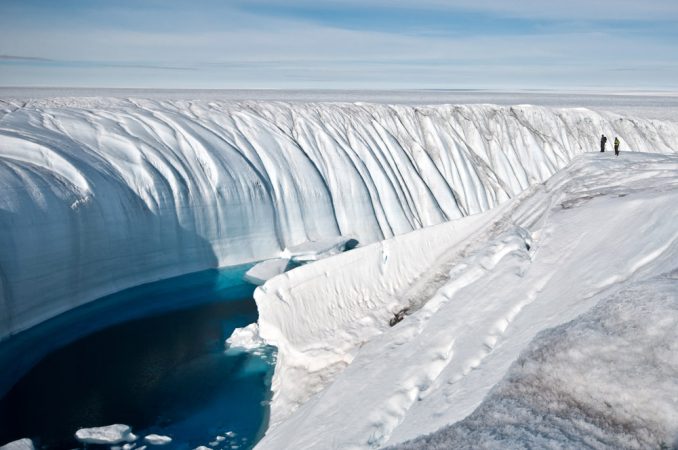Less ice, more seawater
Shrinking ice sheets contribute to rising sea levels, large-scale study confirms

When an ice cube melts, it creates a puddle. When an ice sheet melts, it raises sea levels. It sounds simple, but scientists have debated for decades whether both the Antarctic and Greenland ice sheets actually were shrinking — and how much that melting contributed to rising sea levels.
Now, a new study has provided the best evidence yet of how the polar ice sheets are responding to our warming world. In the study, published in November, an international team of scientists looked at 20 years of data on the ice sheets, collected by 10 satellite missions. The team’s conclusion? The Greenland and Antarctic ice sheets both are losing ice overall. The researchers also found that between 1992 and 2011, meltwater from those shrinking ice sheets caused sea levels to rise by about 11 millimeters (0.4 inch), or about the width of the fingernail on your pinkie. That’s just the contribution from the two ice sheets, though. In all, the ocean rose about five times as much during that period.
Over the 19 years studied, the Greenland ice sheet lost 2.7 trillion metric tons of ice — about the same mass as 8 million Empire State Buildings. Mass is a measure of how much matter an object contains.
The Antarctic ice sheet also shrank, by about 1.3 trillion metric tons. That is roughly the equivalent of 4 million Empire State Buildings. Previously, scientists disagreed whether the Antarctic sheet, the largest mass of ice in the world, was shrinking or growing (or neither).
While the Earth is warming overall, the effect of climate change varies from region to region. Over the last 15 years, for example, scientists have sometimes disagreed over how climate change has affected the polar ice sheets. Many studies found that the sheets lose a lot of ice when icebergs break off of them — and that not enough snow falls on the sheets to make up for the loss. But other studies found that the loss of ice to icebergs or melting was balanced by the gain in snowfall.
Richard Alley, a glacier scientist at Penn State University, told Science News that many of those studies looked at different areas, and over different time periods. In addition, the studies didn’t all use the satellite data in the same way. Those differences made it difficult to compare the results.
The data in the new study matched time periods and areas. The study also combined measurements from multiple satellites.
“Our estimates of ice sheet mass loss are the most reliable to date,” said earth scientist Andrew Shepherd of the University of Leeds in England. He is one of nearly 50 scientists who contributed to the new study.
The scientists also confirmed that ice loss in Greenland, the world’s largest island, is accelerating: It lost ice five times faster between 2005 and 2010 than it did between 1992 and 2000.
The new findings provide a better starting point for scientists studying future sea level rises. Such predictions are still difficult to make, since the new study shows that changes in the ice sheets vary widely from year to year.
The work has some scientists calling for a similar, far-reaching study of Earth’s glaciers. “The next step is to take this comprehensive approach to ice in the rest of the world,” said W. Tad Pfeffer, a glaciologist at the University of Colorado Boulder.
Power Words
ice sheet A layer of ice covering an extensive tract of land, especially a polar region.
iceberg A large, floating mass of ice detached from a glacier or ice sheet.
climate change Long-term, significant change in the climate of Earth. Changes may involve temperature, precipitation and even wind patterns. These changes can occur naturally or in response to human activities, including the burning of fossil fuels, such as coal, and the cutting down of forests.
Greenland A large island that lies in the Atlantic Ocean to the northeast of North America. It lies mostly within the Arctic Circle.
glacier A slowly moving river of ice formed by the accumulation and compaction of snow.
mass The amount of matter an object contains.







